
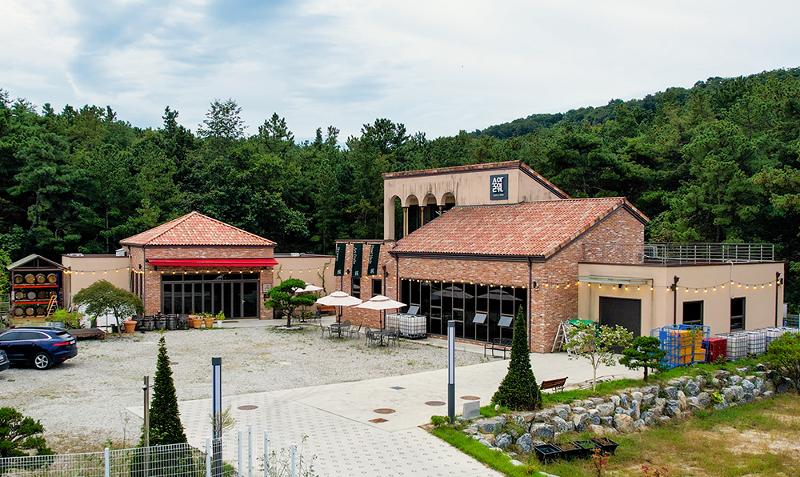
The distillery Soolawon is based in Yeoju, Gyeonggi-do Province.
By Min Yea-Ji
Photos = Kim Sunjoo
Video = Lee Jun Young
Yeoju | Gyeonggi-do Province
“I want to not only maintain and inherit tradition but also make new attempts and develop liquor that could become a tradition a century or two from now.”
Kang Jin Hee, head of the distillery Soolawon, was speaking about gwahaju, a clear liquor mixed with a bit of soju that had existed only through old documents but was revived by her business.
Literally meaning “liquor that does not spoil during summer,” the drink is made by adding liquor with high alcohol content by volume (ABV) to makgeolli (milky rice wine) or yakju (clear liquor) while the latter two are being fermented. Thus gwahaju does not spoil and can endure hot weather, with a high ABV and sweet taste.
Korea.net on Sept. 14 visited Soolawon, whose Mediterranean-style building was eye-catching thanks to its red roof tiles and bricks. Passing the parking lot led to a building where visitors can try distilling liquor and tasting it. The adjacent two-floor building offered liquor making on the first floor and research and development for new types of alcoholic beverages on the second.
Kang was not born to a distilling family and did not inherit such a tradition. She was simply a housewife who liked drinking and learning about Korean liquor, and this led her to opening a distillery in 2015 to share domestic liquor with more people.
“I was sad that our good liquor is disappearing into history, and that led me to make gwahaju. I thought, ‘OK, let’s revive this liquor. Let’s revive this liquor from history,’ and that’s how I started the distillery,” she said.
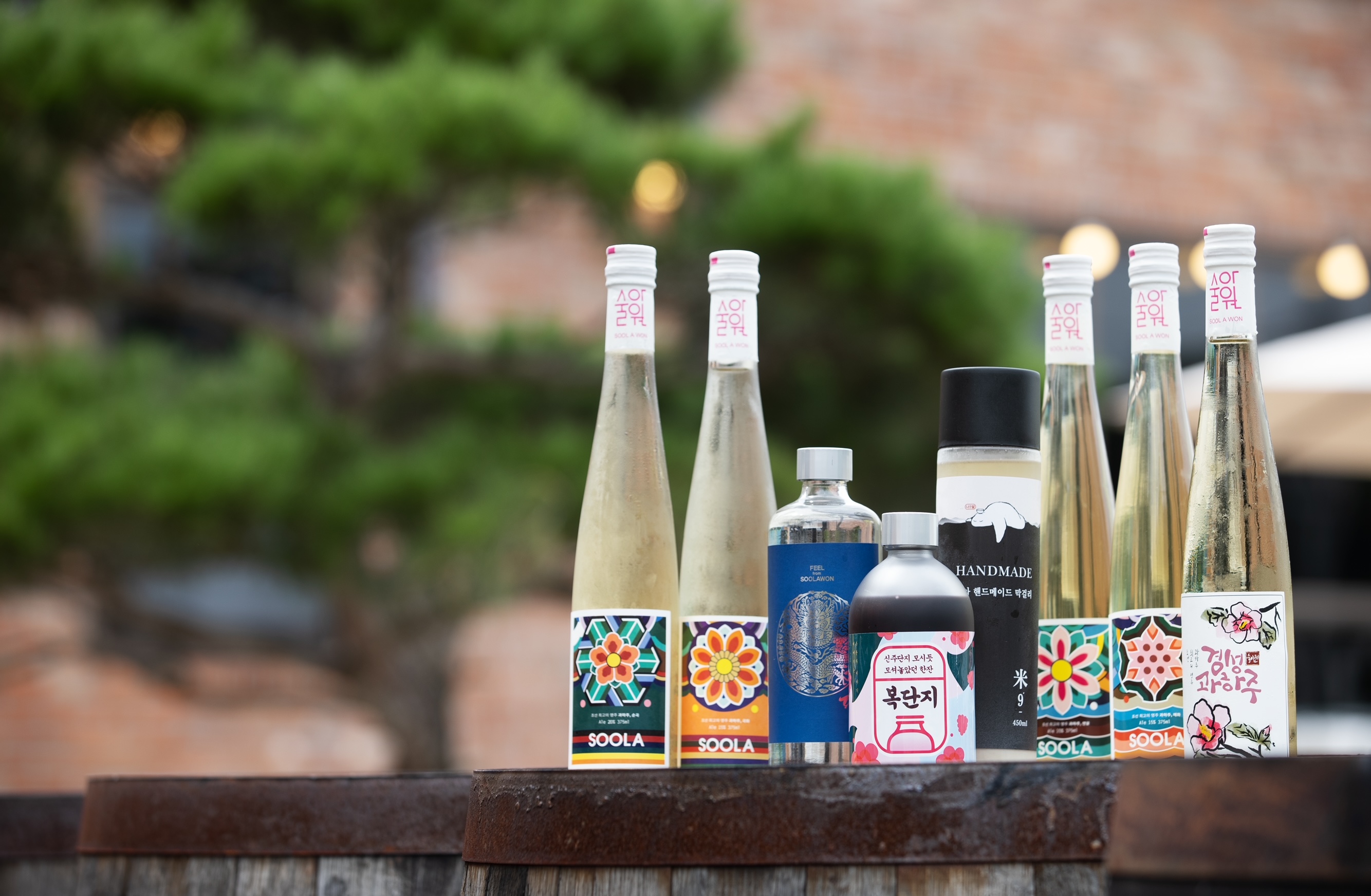
The gwahaju (clear liquor mixed with a bit of soju), soju, raspberry wine and makgeolli (milky rice wine) displayed were made by the distillery Soolawon in Yeoju, Gyeonggi-do Province. Raspberry wine is made by fermenting rice and adding ground raspberry, as the fruit is hard to ferment due to low sugar content.
Park Jae-beom is the head of Won Spirits, a company whose Won Soju brand is all the rage in the domestic liquor market. He said he admires as his “soju mentor” Kim Won-ho, who runs the distillery Mowall in Wonju, Gangwon-do Province.
In 2020, Mowall received the President’s Award for its soju made from the regional rice totomi, which is 10 times more expensive than imported tapioca, which is often used in regular soju.
Kim worked as an engineer at a large corporation for more than 20 years before opening his distillery in 2014 in his hometown of Wonju. “I adopted the technology for fermenting uncooked rice developed by the National Institute of Agricultural Sciences. We also used the yeast extracted by the Korea Food Research Institute from nuruk (fermentation starter), and thus got a stable result by reducing fermentation time and standardizing the liquor’s quality and taste,” he said.
“We increased the yeast from nuruk in mitsool (primary mash) to eliminate nuruk’s odor and confirmed through a microscope the volume of yeast in the second deotsool (a combination of grain, yeast and water added to mitsool). If there was a lot of yeast, we added less nuruk and if there was a little, we put a lot in and accordingly controlled the amount of nuruk.”
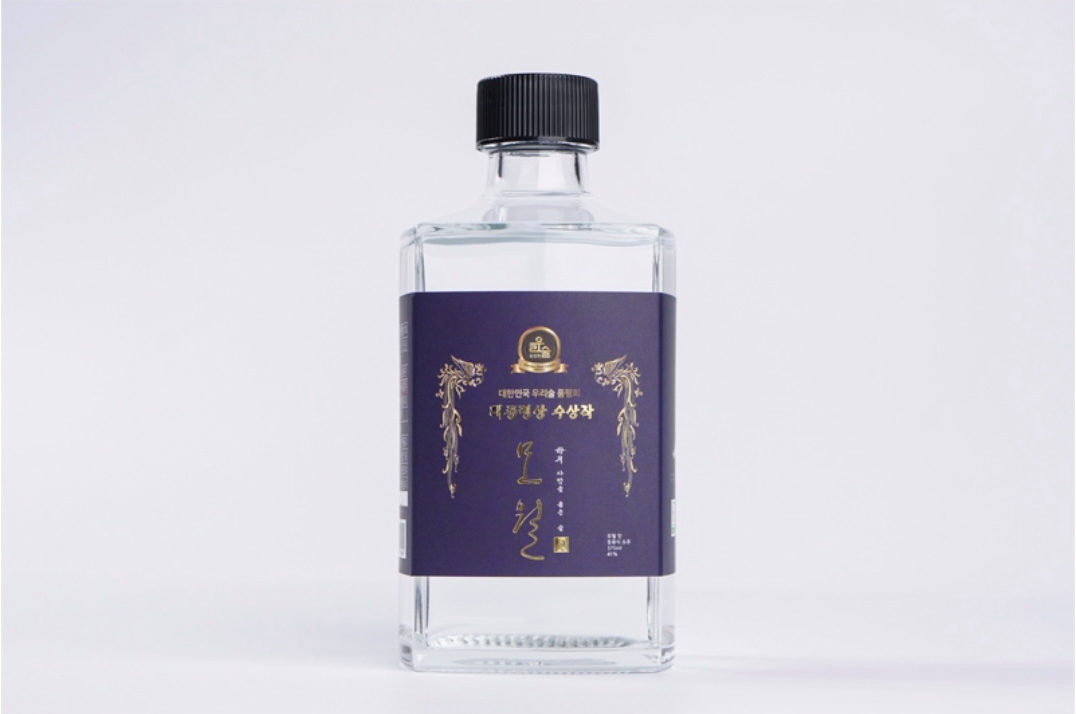
Mowall In is a liquor that earned the President’s Award at the 2020 Korean Sool Awards. (Screen capture from Mowall’s website)
Many players in domestic liquor like Kang and Kim entered the industry because of their love for Korean booze. Their products have gained popularity through their experimental brewing methods not bound by tradition and output of new types by using ingredients made from regional agricultural products.
From around 2010, private institutes began offering systematic education on liquor production like Korea Studio Sool, Guardian of Korean Traditional Liquor, Susubori Academy and Makgeolli School.
Students went on to set up their own breweries that emphasized value consumption and outstanding quality using good ingredients. These “premium distilleries of traditional liquor” have the same goals but different ingredients and methods of rice manufacturing, fermentation and ripening.
Thus these businesses have helped diversify the domestic liquor market. Well-known brands among traditional liquor aficionados such as Poongjeong Sagye, Cheonbihyang, Soolawon, Mowall and Mir are all made by these distilleries.
Experts on premium traditional drinks were the first to recognize the niche market’s value. Poongjeong Sagye (2021), Mowall In (2020) and Mir 40 (2018) each received the President’s Award at the Korean Sool Awards hosted by the Ministry of Agriculture, Food and Rural Affairs and Korea Agro-Fisheries and Food Trade Corp.
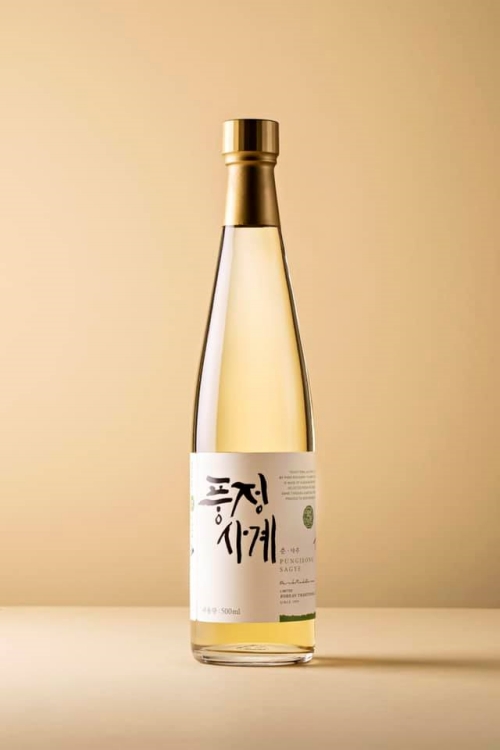
The drink Poongjeong Sagye Chun last year won the President’s Award at the Korean Sool Awards. (Screen capture from Poongjeong Sagye’s Facebook)
Honey Moon Wine, the first domestic liquor made of honey, was served at the banquet marking President Yoon Suk Yeol’s inauguration in May this year. Omyrose Kyol, the world’s first omija (schisandra berry) wine, was selected as the drink for the toast at the Korea-U.S. summit in the same month. The ripening of alcohol in an oak barrel was unprecedented in making traditional liquor and was thus considered new and experimental.
Boksoondoga’s hand-brewed makgeolli, which was served at the 2012 Nuclear Security Summit and used for toasting at a 2013 dinner with heads of diplomatic missions at Cheong Wa Dae, is growingly popular and called “champagne makgeolli” by young people.
The drink is made by fermenting handmade nuruk for a long time in traditional pottery. Due to the natural carbonic acid created during the fermentation process, Boksoondoga’s makgeolli gives a sense of refreshment like champagne and is thus considered to have created the new genre “sparkling makgeolli.”
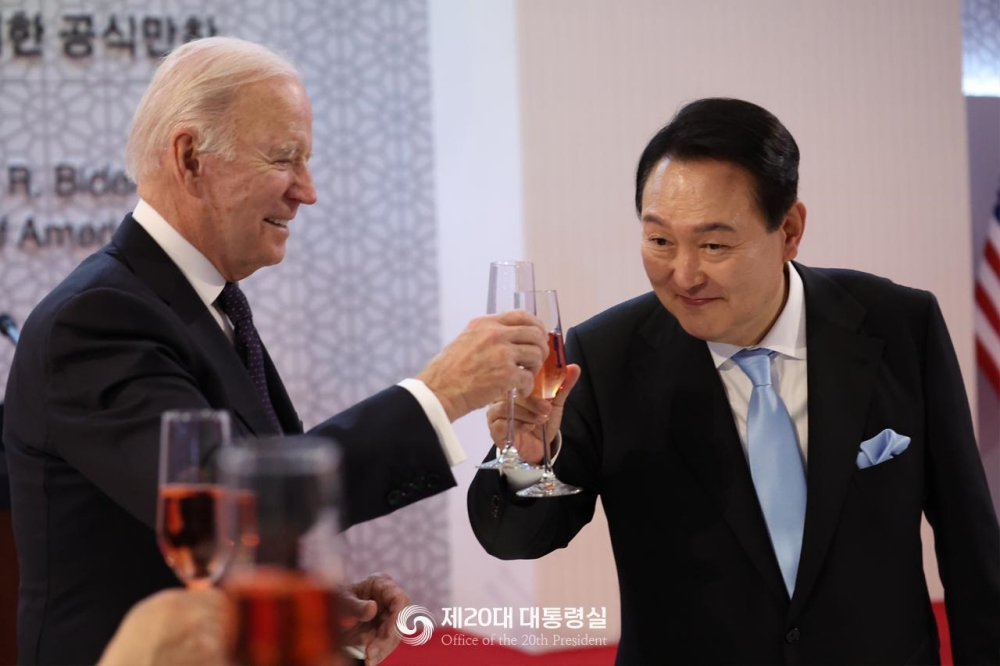
President Yoon Suk Yeol (right) and U.S. President Joe Biden on May 21 give a toast with glasses containing Omyrose Kyol at the official banquet of the Korea-U.S. summit. The sparkling wine was made with omija (schisandra berry) at Ominara in Mungyeong, Gyeongsangbuk-do Province. (Office of the 20th President)
A ministry report on domestic liquor trends last year found that the scale of the domestic liquor market declined from KRW 9.2 trillion in 2017 to KRW 8.8 trillion in 2020, but that of the market for traditional domestic liquor jumped from KRW 40 billion to KRW 62.7 billion.
The report said traditional liquor brands themselves are competitive and the market for premium traditional liquor has potential.
Korea Studio Sool director Bak Rok-dam said, “An increasing number of people are receiving systematic education in liquor making, led by those in their 20s or 30s,” adding, “The traditional liquor market will be better 10-20 years from now.”
jesimin@korea.kr























